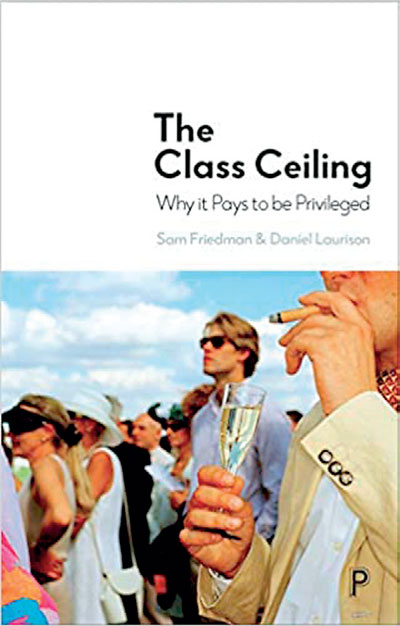Sunday Feb 15, 2026
Sunday Feb 15, 2026
Monday, 14 February 2022 00:39 - - {{hitsCtrl.values.hits}}
 I enjoyed reading a recent best-seller. It is not about ‘glass ceiling’ as we often speak of but of ‘class ceiling’ which covertly controls the society. The way sociologists, Sam Friedman and Daniel Laurison narrate the delicate details is much thought-provoking with multiple insights for sensible Sri Lankans. Today’s column is a management reflection of it.
I enjoyed reading a recent best-seller. It is not about ‘glass ceiling’ as we often speak of but of ‘class ceiling’ which covertly controls the society. The way sociologists, Sam Friedman and Daniel Laurison narrate the delicate details is much thought-provoking with multiple insights for sensible Sri Lankans. Today’s column is a management reflection of it.
Overview
Connections are more important than competencies is something I have observed in our soil. Based on the seminal work by Sam and Daniel, it appears that the issue is far beyond the local, and regional boundaries. Based on 175 interviews across four case studies – television, accountancy, architecture, and acting, they have explored the complex barriers facing the upwardly mobile in the Britain.
“What affects whether you get promoted is not just your ability” is their starting stance. Then they provide convincing evidence to show “why it pays to be privileged.” They initially observe the state of Britain as follows: “This impassioned sloganeering is partially rooted in concerns that Britain is becoming less and less open. Certainly, the postwar expansion of ‘room at the top’ has slowed. And rates of absolute upward social mobility have begun to decline. There is even some evidence that relative rates have decreased.”
Why is the rhetoric of social mobility so frequently deployed in discussions about inequality? The authors take a realistic standpoint. “Well, a big part of the reason is that the topic of social mobility speaks directly to the larger principle of fairness. If some people are more likely than others to get the most highly prized jobs, regardless of whether they are the most able or work the hardest, most people would agree that this is unfair. Moreover, jobs at the top of the class distribution almost always pay better – so the question of who has access to those jobs is also a question of economic inequality, of how fair the distribution of earnings is.”
In Britain about half of those who get elite jobs are from upper-middle-class backgrounds, although only about a third of all Brits come from these backgrounds, state the authors. According to their research, people from working-class origins do sometimes make it into elite jobs, but it is rare; only about 10% of people from working-class backgrounds (3.3% of people overall) traverse the steepest upward mobility path. Put another way, people from upper-middle-class origins have about 6.5 times the chance of landing an elite job compared to people from working-class backgrounds. Origins, in other words, remain strongly associated with destinations in contemporary Britain, conclude the authors.
Bourdieu’s work as a bedrock
The approach to class, and especially class origin by Sam and Daniel is strongly influenced by the work of French sociologist Pierre Bourdieu. At root, a “Bourdieusian” lens insists that our class background is defined by our parents’ stocks of three primary forms of capital: economic capital (wealth and income), cultural capital (educational credentials and the possession of legitimate knowledge, skills, and tastes) and social capital (valuable social connections and friendships). As the authors observe, these not only structure the overarching conditions of our childhoods, but we also tend to inherit them. This process is straightforward in terms of economic and social capital: upper-middle-class parents are able to directly pass on to their children both financial assets and valuable social contacts, both of which go on to confer advantage in fairly self-evident ways.
The inheritance of cultural capital is more complex. As the authors elaborate, the material affluence of the educated upper-middle classes, Bourdieu argued, affords them a certain distance from economic necessity that is then strongly reflected in the way they socialise their children. In particular, they inculcate a certain ‘habitus’ – a set of dispositions that organise how their children understand and relate to the world around them. Some of these dispositions are embodied; they manifest through specific modes of bodily comportment such as accent, inflection, gesture, and posture, as well as styles of dress, etiquette, and manners.
But perhaps most significant is the way in which privileged parents imprint in early childhood a propensity for what Bourdieu called ‘symbolic mastery.’ This includes a certain mode of using language, including an elaborate vocabulary and ‘correct’ grammar, a general familiarity with abstraction and theoretical ideas, and also a particular detached, knowing aesthetic orientation to culture and taste.
Theory vs. Reality
One may find the above ideas somewhat abstract and theoretical. As the authors state, there is now a rich body of empirical research that has investigated more precisely how the transmission of cultural capital actually plays out in everyday life. As they report, one of the most influential examples comes from the US sociologist Annette Lareau, who looked at the ways cultural capital is inculcated in the family. She studied the home lives of 9- and 10-year-olds from different class backgrounds and found large and consequential class differences in parenting styles.
The upper-middle-class parents (those with professional jobs and university degrees) approached raising their children as a project in ‘concerted cultivation’ – providing extensive support with homework, carefully curating complements of extra-curricular activities and engaging their children consistently in conversation and discussion, all of which acted to cultivate their capacity for symbolic mastery.
Working-class and poor parents, on the other hand, practiced what Lareau calls ‘the accomplishment of natural growth.’ These parents were just as committed to ensuring that their children grew into healthy, secure adults. But they approached their roles differently. Their children got to spend much more time making their own entertainment, inventing games with neighbourhood children, or watching television. This was partly a result of the economic constraints parents faced. But it was also about different views about child-rearing and the world at large; where upper-middle-class parents believed it was important to manage every moment of their children’s time and advocate on their behalf, working-class parents had a greater belief in children’s independence, and a greater deference to institutions such as schools.
From ‘glass’ ceiling to ‘class’ ceiling
As we are aware, glass ceiling refers to a symbolic barrier that prevents certain individuals from being promoted to managerial- and executive-level positions within an organisation or industry, especially applicable to women and minorities. The way Sam and Daniel observe, the key point that emerges from this glass-ceiling literature is that what we conventionally understand as ‘merit’ is not the only, or even the main, determinant of career success.
“Study upon study has shown that even when women and racial-ethnic minorities are just as capable, talented and hard-working as white men in every way these attributes can be measured, they are still less likely to get on. This has obvious implications for our study,” observe the authors. “We know that those from working-class backgrounds have also been historically excluded from elite occupations (albeit for different reasons), so to what extent might the mechanisms driving the glass ceiling also apply to class origin?”
Connecting insights about the glass ceiling to the topic of class is not just about drawing parallels. After all, class, gender, race (and many other aspects of social division) do not operate as separate and mutually exclusive axes of inequality, opine the authors. “Instead, they almost always build on each other and work together. This, of course, is the key insight introduced by the concept of intersectionality. In the context of social mobility an intersectional lens is key.”
Sam and Daniel state that there is compelling evidence that the experience of upward social mobility is distinct, and often particularly difficult, for women, and for members of racial-ethnic minority groups. As Steph Lawler has explained, no female equivalent exists of the heroic tale of ‘the working-class boy made good,’ and instead ‘women’s desires for, and envy of, respectability and material goods’ have long been portrayed as markers of pretence and triviality. A number of leading female academics, including Beverley Skeggs, Bell Hooks, Diane Reay, Kalwant Bhopal, and Lynsey Hanley, have also underlined the specificity of women’s and ethnic minorities’ mobility experiences via vivid accounts of their own complex and uneasy upward trajectories, state the authors.
While rich and varied, what unites these accounts is the enduring sense of dislocation felt by these women, a feeling that they do not fully ‘fit’ in the social spaces of past or present. As Skeggs notes, while she feels like a ‘fraud’ among academic colleagues, her working-class family cannot provide refuge. Instead, in this context, she is a disappointment, someone who ‘got above herself,’ who reneged on her duty to family and particularly the traditional female role she was expected to play within it.
From getting ‘in’ to getting ‘on’
The other reason to expect working-class people may face challenges within elite occupations is that we know that they face acute barriers ‘getting in’ in the first place, state the authors. They have cited the work of scholars who have been formational in elucidating these issues of access. In the US, Lauren Rivera has shown that every step of the recruitment and hiring process at elite professional service firms works to favour the already-privileged.
As Rivera further explains, first, top firms eliminate nearly every applicant who did not attend an elite college or university. They then put applicants through a series of ‘informal’ recruitment activities, such as cocktail parties and mixers, that are generally uncomfortable and unfamiliar to those from working-class backgrounds. Finally, when formal interviews happen, selectors often eschew formal criteria and evaluate candidates more on how at ease they seem, whether they build rapport in the interview, and whether they share common interests. Rivera describes this process as ‘cultural matching.’
Relevance to Sri Lanka
“The control of information is something the elite always does, particularly in a despotic form of government. Information, knowledge, is power. If you can control information, you can control people.” What Tom Clancy, an American Novelist stated in the western context may make much sense here as well. Variety of aspects of elitism is widely present in mainstream politics as well as other spheres inclusive of the corporate sector. Class struggle in Sri Lanka in many forms has been a perennial phenomenon. The tension between the “free education” and the “freedom of education” may also highlight the advantages of being privileged.
Celebrating of the 74 years of “regaining of independence” amidst an economically dependent era with much vulnerability, the terms such as diversity, inclusivity, equal opportunity, and transparency should not be merely confined to policy documents. A plenty of food for thought for us paving ways to fresh insights and focused initiatives.
(The writer is the immediate past Director of Postgraduate Institute of Management, and can be reached through [email protected], [email protected] or www.ajanthadharmasiri.info.)